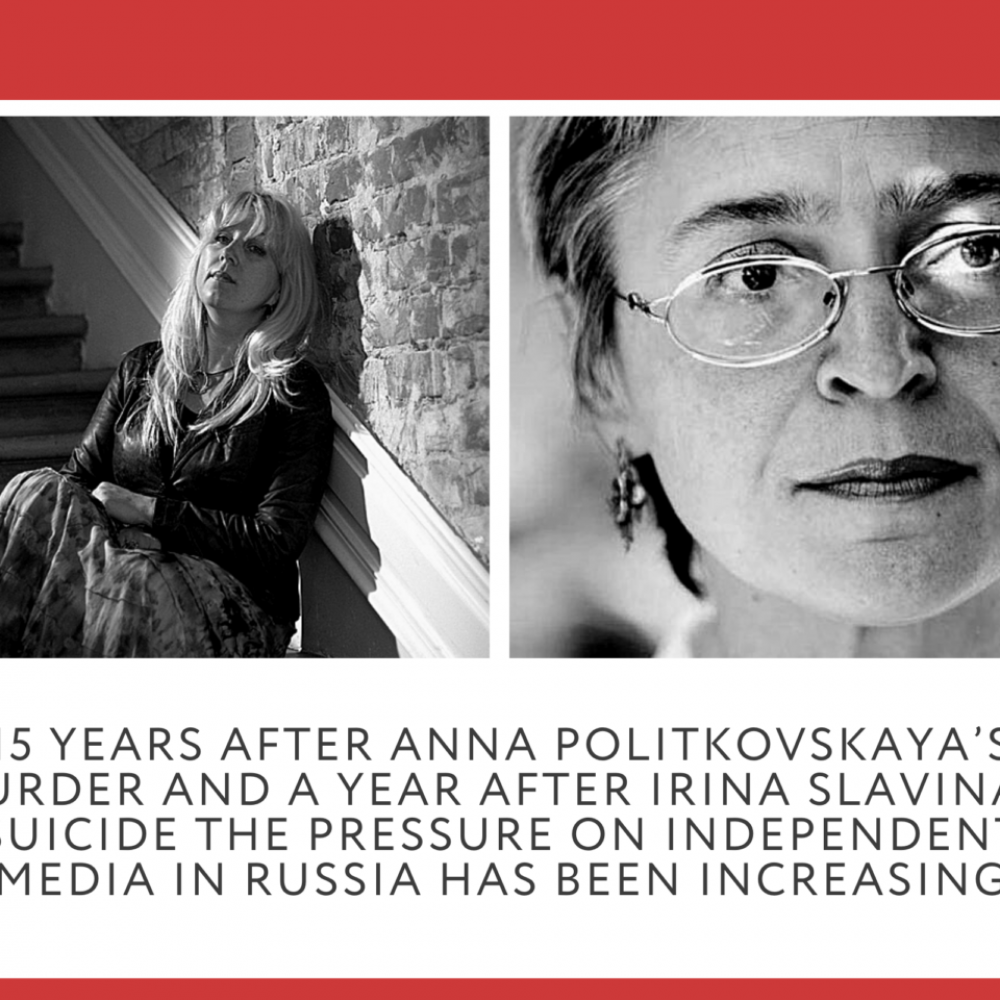LONDON, OCTOBER 7, 2021 – 15 years ago, on October 7, 2006, the Novaya Gazeta journalist Anna Politkovskaya was shot and killed in the lift of her Moscow apartment building. 15 years after her death, those who ordered her murder are still not brought to justice.
A year ago, on October 2, 2020, Irina Slavina, editor-in-chief of the Nizhny Novgorod online news outlet Koza.Press committed self-immolation in front of the Ministry of Internal Affairs building in Nizhny Novgorod, Russia. The Investigate Committee of Nizhny Novgorod Region refused to initiate a criminal case on the article on «incitement to suicide».
Since the brutal murder of Politkovskaya, at least 34 Russian journalists have been killed, committed suicide or died in unclear circumstances. Most of these death cases remain unsolved.
The tragic death of Irina Slavina became the consequence of many years of hybrid attacks. The systemic harassment of the journalist included several administrative violation cases, fines, leaflets with abusive language in the entrance to the block of flats where she lived, and constant denunciations and police checks. The last straw became a search in her flat at 6 in the morning on October 1 as part of a criminal case about participation in an “undesirable organisation” (her denunciation had been written by Ilya Savinov). 12 employees of the Investigative Committee of the Russian Federation, the police, and the SOBR [Special Rapid Response Unit] seized all the electronic information storage media, computers, and telephones of the journalist and her family, and all work-related writing pads. Besides that, the Koza.Press website was subjected to a DDoS attack. The next day the journalist committed suicide, having inculpated the Russian Federation in her death in a Facebook post.
The pressure on independent journalism in Russia is increasing year by year. In the first nine months of 2021, the Justice for Journalists Foundation recorded 1303 attacks on media workers in Russia, exceeding the number of attacks in 2020 – 1284. Currently, 16 media workers have been sentenced to prison and labour camp terms, five are under house arrest, and 18 are awaiting trial in pre-trial detention centres.
In 2021, the main method of pressure on independent media workers has been labelling them as ‘foreign agents’ and labelling organisations they cooperate with as ‘undesirable’. As of today, the ‘foreign agents’ register contains 343 entities, 55 of which are media outlets and 11 – organisations supporting independent media. In 2021 alone, 11 media outlets and 42 journalists were added to the registry. The JFJ, together with more than 230 NGOs, media outlets, civic and educational projects, signed a petition on repealing the law on ‘foreign agents’.
Due to the systematic pressure from authorities, many journalists were forced to leave the country, including News of Kiselyovsk editor-in-chief Natalia Zubkova, The Insider editor-in-chief Roman Dobrokhotov, Proekt (The Project) editor Roman Badanin, his deputy Mikhail Rubin, political scientist and author of the Telegram-channel Fyodor Krasheninnikov, blogger Ruslan Usachev, and many others.
Several news outlets were forced to shut down in 2021: MBK Media, Open Media, Proekt (The Project), VTimes, News of Kiselyovsk, journalistic project Fourth Sector, an informal association of lawyers and journalists Team 29.
The Justice for Journalists Foundation calls on the international community to watch closely the escalating pressure on media workers, which systematically destroys the freedom of speech in Russia.

